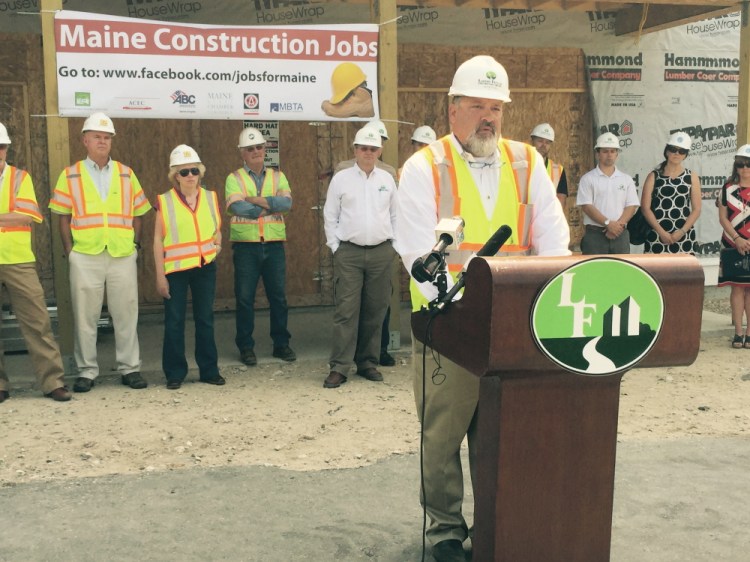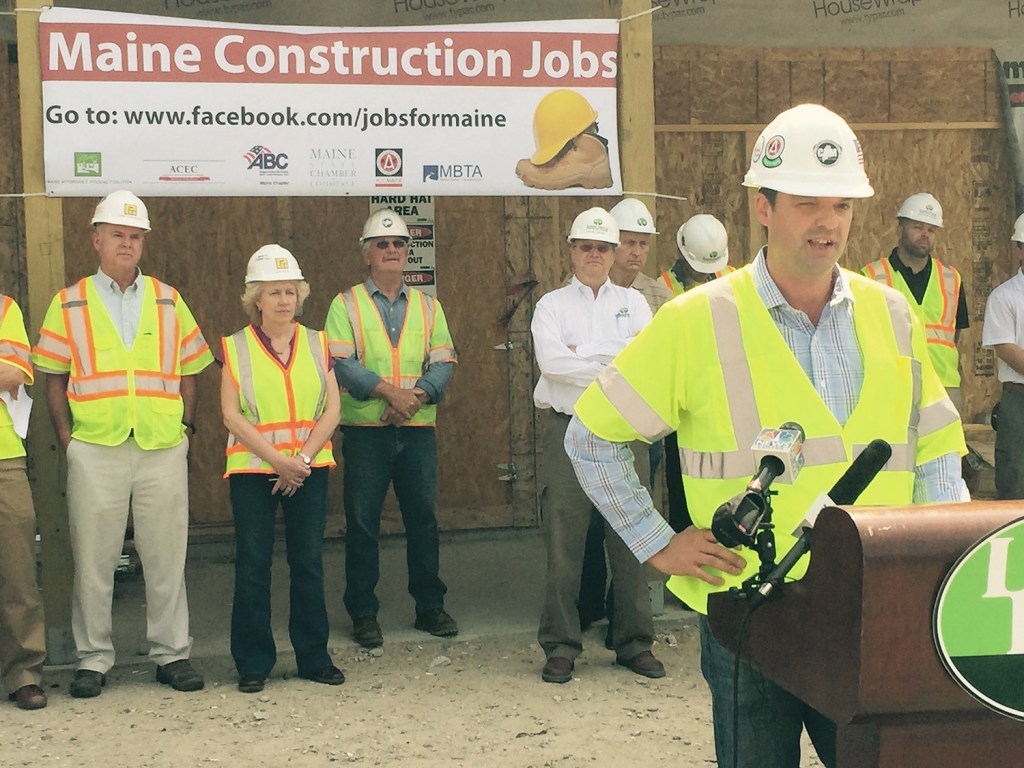In the waning days of the current legislative session, representatives of Maine’s construction industry are getting worried that proposals to fund infrastructure and housing projects won’t make it onto this year’s November ballot.
Industry leaders organized a news conference Thursday at a construction site in South Portland to argue the merits of pending bills that would allow the state to borrow as much as $250 million to improve roads and bridges, build affordable senior housing and upgrade stream crossings and drainage systems statewide.
They argued that the money would jump-start the state economy, create jobs, provide vital shelter to seniors, make transportation safer, help the environment and boost tourism.
The advocates included leaders of the Associated General Contractors of Maine, American Council of Engineering Companies Maine Chapter, Maine Better Transportation Association and Maine Chamber of Commerce. They urged state lawmakers to pass a $65 million bond measure to fund 1,000 units of affordable senior housing, and a $10 million bond proposal to fund improvements to stream crossings and culverts.
Both bills are bipartisan, meaning that even if passed there is a good chance Gov. Paul LePage would veto them, said Timothy Ouellette, chief financial officer of Freeport-based CPM Constructors.
“The governor says he’s going to veto everything proposed by Democrats,” Ouellette said.
LePage spokeswoman Adrienne Bennett did not respond to questions Thursday about whether he would veto the bills because of their Democratic co-sponsors.
HOLDING BONDS HOSTAGE
The lack of consistent support for infrastructure and housing projects at the state level has damaged Maine’s construction industry and forced a mass exodus of skilled construction workers, Ouellette said. LePage has a history of withholding voter-approved bonds as a means of gaining political leverage for measures he supports, such as repaying debt owed to the state’s hospitals and increasing timber harvesting on state-owned lands to pay for residential energy-efficiency programs.
In 2006, there were roughly 32,000 state residents employed in construction, Ouellette said. Now that number is down to about 23,600.
Meanwhile, the affordable-housing needs of Maine’s growing senior population are being largely ignored, the industry leaders said.
Thursday’s news conference took place at Ridgeland Gardens, an affordable senior housing community under construction in South Portland. One speaker at the event was Kevin French, owner of Scarborough-based Landry/French Construction, the lead contractor on the Ridgeland project.
“I’ve been told there’s already a waiting list for people to move in,” said French, adding that the project employs 75 workers.
The building industry representatives pointed to a recent report by APT Associates commissioned by the Maine Affordable Housing Coalition, which estimated a 9,000-unit shortfall of senior housing throughout the state. It predicted the shortfall would grow to 15,000 within a few years if no new units are built.
Maine State Chamber of Commerce lobbyist Ben Gilman spoke in favor of L.D. 1069, the stream crossing bill, which he said would help improve access to fish habitat and prevent road washouts when streams are flowing high.
The proposed bond would have a dual impact of boosting tourism and addressing environmental concerns, Gilman said.
The construction advocates also favor passage of a bond measure to improve Maine’s transportation infrastructure. The most specific transportation bill pending before the Legislature is a $175 million bond measure favored by LePage, L.D. 1415.
If passed, all three bond proposals would require the approval of Maine voters in November. So far, none has successfully made it through committee.
MATCHING FUNDS AT RISK
Many state lawmakers have been ambivalent about whether transportation projects should be stepped up using borrowed money.
In May, members of the Transportation Committee moved to carry over a bill that calls for re-evaluating how Maine pays for road and bridge work, until next year. They unanimously voted to accept a different bill, which creates a commission to study how the state should fund its transportation infrastructure.
Rep. Andrew McLean, a Democrat representing Gorham and Scarborough who sponsored both bills, said ongoing budget talks may explain why the Appropriations and Financial Affairs Committee has not moved any of the proposed bond measures forward to the full House and Senate.
“While I don’t serve on Appropriations and cannot independently confirm what will or will not happen, I have heard that the conversation around the budget is taking up a lot of the oxygen in the room,” said McLean, who is House Chair of the Transportation Committee. “Unfortunately these critical investments are being pushed to the sidelines.”
McLean said Maine risks losing out on several hundred million dollars of matching federal funds if it does not pass a transportation bond package.
Sen. James Hamper, a Republican from Oxford who is Senate chairman of the Appropriations Committee, said it is sitting on a total of $900 million worth of proposed bond measures.
Hamper said the governor’s office generally indicates to the committee the acceptable limit for bond measures but has not done so this session.
“I have not received any information on borrowing yet,” he said.
The Legislature is expected to adopt a largely status quo transportation budget of $627 million for the next two years. The budget includes $73.2 million for improvements in highways and bridges, but none for the projects identified by the Maine Department of Transportation’s capital plan.
BAD ROADS, BRIDGES
In May, the national research group TRIP released a report that described Maine’s bridges and rural roads as among the worst in the nation. TRIP, which promotes policies that reduce traffic congestion, said 26 percent of Maine’s rural roads have pavement in poor condition, and that only seven other states have roads that are worse.
The report also found that 15 percent of the state’s rural bridges are structurally deficient. Only eight other states have a higher percent of deficient bridges, according to the report.
Stephen Sawyer, vice president of transportation services at South Portland-based Sebago Technics Inc., said poorly maintained roads and bridges pose safety risks to motorists and make it more difficult for emergency vehicles to respond. The state’s poor transportation infrastructure also hobbles growth industries such as organic farming, he said.
With interest rates near historic lows, it makes economic sense for Maine to borrow money to make vital infrastructure improvements that will last for decades, Sawyer said.
“The time is now for us to invest,” he said.
This story was updated at 11:08 a.m. on Friday, June 12 to clarify that Rep. Andrew McLean is the sponsor of both the road and bridge bond, as previously stated, as well as the bill to study how the state should fund its transportation infrastructure.
Send questions/comments to the editors.





Success. Please wait for the page to reload. If the page does not reload within 5 seconds, please refresh the page.
Enter your email and password to access comments.
Hi, to comment on stories you must . This profile is in addition to your subscription and website login.
Already have a commenting profile? .
Invalid username/password.
Please check your email to confirm and complete your registration.
Only subscribers are eligible to post comments. Please subscribe or login first for digital access. Here’s why.
Use the form below to reset your password. When you've submitted your account email, we will send an email with a reset code.